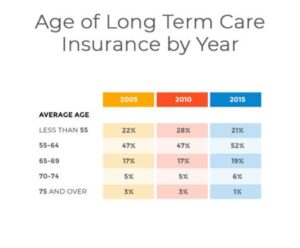florida long term care insurance, Explore essential insights on Florida long-term care insurance options, benefits, costs, and how to choose the right provider for your future planning.As we navigate the complexities of aging and health care, securing a reliable safety net becomes increasingly vital. Florida Long Term Care Insurance offers individuals and families the peace of mind they need as they plan for the future. This specialized insurance is designed to cover the costs associated with long-term care services, such as assisted living or in-home assistance, ensuring you receive the support you need without straining your finances. In this article, we’ll delve into the various options available, highlight the key benefits, and provide essential guidance on evaluating costs and selecting the right provider. With Florida Long Term Care Insurance, you can take proactive steps in safeguarding your well-being and financial stability as you age gracefully in the Sunshine State.
Understanding Florida Long Term Care Insurance Options
When considering florida long term care insurance, it’s crucial to understand the various options available to you. The state offers a range of plans designed to meet diverse needs, ensuring comprehensive care for individuals as they age or face chronic health conditions.
Here are the primary types of long term care insurance options in Florida:
| Type of Policy | Description |
|---|---|
| Traditional Long Term Care Insurance | Offers coverage for a variety of long term care services, including in-home care, assisted living, and nursing home care. Premiums are fixed, but can increase over time. |
| Hybrid Policies | Combines life insurance or annuities with long term care benefits. If you don’t use the long term care benefit, your beneficiaries receive the life insurance payout. |
| State Partnership Programs | These programs allow policyholders to protect a portion of their assets while still qualifying for Medicaid, should the need arise for additional long term care. |
Each of these options comes with its benefits and considerations. It’s essential to assess your specific needs and financial situation before choosing a policy. Understanding the differences will help you make an informed decision when selecting the most suitable florida long term care insurance plan for you or your loved ones.
Key Benefits of Florida Long Term Care Insurance Plans
Choosing to invest in florida long term care insurance plans can provide numerous advantages for individuals planning for their future health care needs. Here are some key benefits:
- Financial Protection: Long term care insurance acts as a safety net for unexpected medical expenses, helping to preserve your savings and assets. With rising long-term care costs, having a well-structured policy can alleviate the financial burden on your family.
- Choice of Care: Policyholders typically have the flexibility to choose their preferred type of care, whether it’s in-home care, assisted living, or nursing home facilities. This ensures that you receive care tailored to your personal preferences and needs.
- Peace of Mind: Knowing that you have a plan in place for potential future health crises can reduce stress for both you and your loved ones. This sense of security is invaluable when facing the uncertainties of aging.
- Quality of Care: Many Florida long term care insurance plans may provide access to higher-quality care options. Insurers often work with well-regarded facilities and providers, ensuring that you receive the best possible treatment.
- Tax Benefits: Depending on your circumstances, premiums paid for long term care insurance may be tax-deductible. This can lead to significant savings over time, making the investment more affordable.
The importance of having a florida long term care insurance plan cannot be overstated. The benefits extend beyond just financial security—they offer choices, peace of mind, and access to quality care when it’s needed the most.
Evaluating Costs and Coverage for Florida Long Term Care Insurance
When considering florida long term care insurance, it’s essential to evaluate both the costs associated with the plans and the coverage they provide. Understanding these factors will help you make an informed decision that suits your needs and budget.
Firstly, the costs of long-term care insurance can vary widely based on several factors, including your age, health status, and the extent of coverage you choose. It’s important to analyze premium rates carefully. Insurance providers typically offer different pricing tiers depending on the level of care required, such as in-home care, assisted living, or nursing home coverage.
Additionally, consider the elimination period, which is the waiting time before the benefits kick in. A longer elimination period usually results in lower premiums but requires more personal financial responsibility initially. Balancing your needs between premium costs and coverage levels is a critical aspect of choosing the right policy.
Moreover, it is vital to review the details of what each policy covers. Most policies offer a range of services, including:
- In-home healthcare
- Assisted living facilities
- Nursing home care
- Respite care
Do not overlook the fine print, as some policies may have limitations on the number of days of coverage or specific exclusions related to pre-existing conditions. Understanding the benefits and limitations is essential to ensure that the plan you choose aligns with your expected needs.
A thorough evaluation of costs and coverage when choosing florida long term care insurance will provide you with peace of mind knowing that you have secured a plan that adequately prepares you for future healthcare needs. Don’t hesitate to consult with licensed insurance agents who can provide tailored advice based on your individual circumstances.
How to Choose the Right Florida Long Term Care Insurance Provider
Choosing the right provider for florida long term care insurance is a crucial step in ensuring that you or your loved ones receive the most suitable care when needed. Here are several factors to consider when making your decision:
Taking the time to research and consider these factors can lead you to the ideal florida long term care insurance provider that meets your unique requirements, helping you make well-informed choices for the future.
Planning for the Future with Florida Long Term Care Insurance
Planning for the future is vital when considering florida long term care insurance. This type of insurance is designed to ease the financial burden of care services needed as one ages or experiences chronic conditions. As life expectancy increases, many Floridians face the possibility of needing long-term care, making it essential to plan effectively.
Here are some key elements to consider when planning for your long-term care needs:
| Consideration | Description |
|---|---|
| Current Health Status | Evaluate your current health and family history to assess potential future care needs. |
| Care Options | Research various care options available in Florida, including at-home care, assisted living, and nursing homes. |
| Policy Selection | Choose a policy that aligns with your anticipated needs and budget; consider both coverage limits and benefit duration. |
| Inflation Protection | Look for policies that offer inflation protection to keep your benefits aligned with rising costs of care. |
| Pre-Assessment | Some insurance providers offer pre-assessment services. Take advantage of these to understand your eligibility and options. |
By proactively considering these factors, you can ensure that you are better prepared for the possibility of requiring long-term care. This foresight not only contributes to personal peace of mind but also has a significant impact on the financial stability of your loved ones. Ultimately, sound planning with florida long term care insurance can help maintain your quality of life as you age, providing reassurance and support for both you and your family.
Frequently Asked Questions
What is Florida long term care insurance?
Florida long term care insurance is a type of insurance designed to cover the costs associated with long-term care services, including assistance with daily activities such as bathing, dressing, and meal preparation, often provided in a nursing home or through in-home care.
Who should consider purchasing long term care insurance in Florida?
Individuals over the age of 50, those with a family history of chronic illness, and anyone looking to protect their assets from the high costs of long-term care services should consider purchasing long-term care insurance in Florida.
What are the benefits of having long-term care insurance?
florida long term care insurance, The primary benefits of long-term care insurance include financial protection against high care costs, peace of mind knowing that you will receive care when needed, and the ability to choose your preferred healthcare provider or facility.
florida long term care insurance,
How does Florida’s long term care insurance differ from other states?
Florida’s long term care insurance policies may have unique features related to state regulations, such as specific benefit levels, inflation protection options, and eligibility criteria that can vary from those in other states.
What factors influence the cost of long term care insurance in Florida?
Factors influencing the cost of long-term care insurance in Florida include the applicant’s age, health status, the amount of coverage desired, the length of coverage, and any additional benefits or riders selected.
Are there any tax benefits associated with long term care insurance in Florida?
Yes, premium payments for long term care insurance may be tax-deductible, and benefits received from policies can often be tax-free, subject to certain conditions, helping policyholders save on costs.
How do I choose the right long term care insurance policy in Florida?
florida long term care insurance, To choose the right long term care insurance policy in Florida, consider assessing your specific needs, researching providers, comparing policy options, and consulting with a licensed insurance agent who specializes in long-term care.



